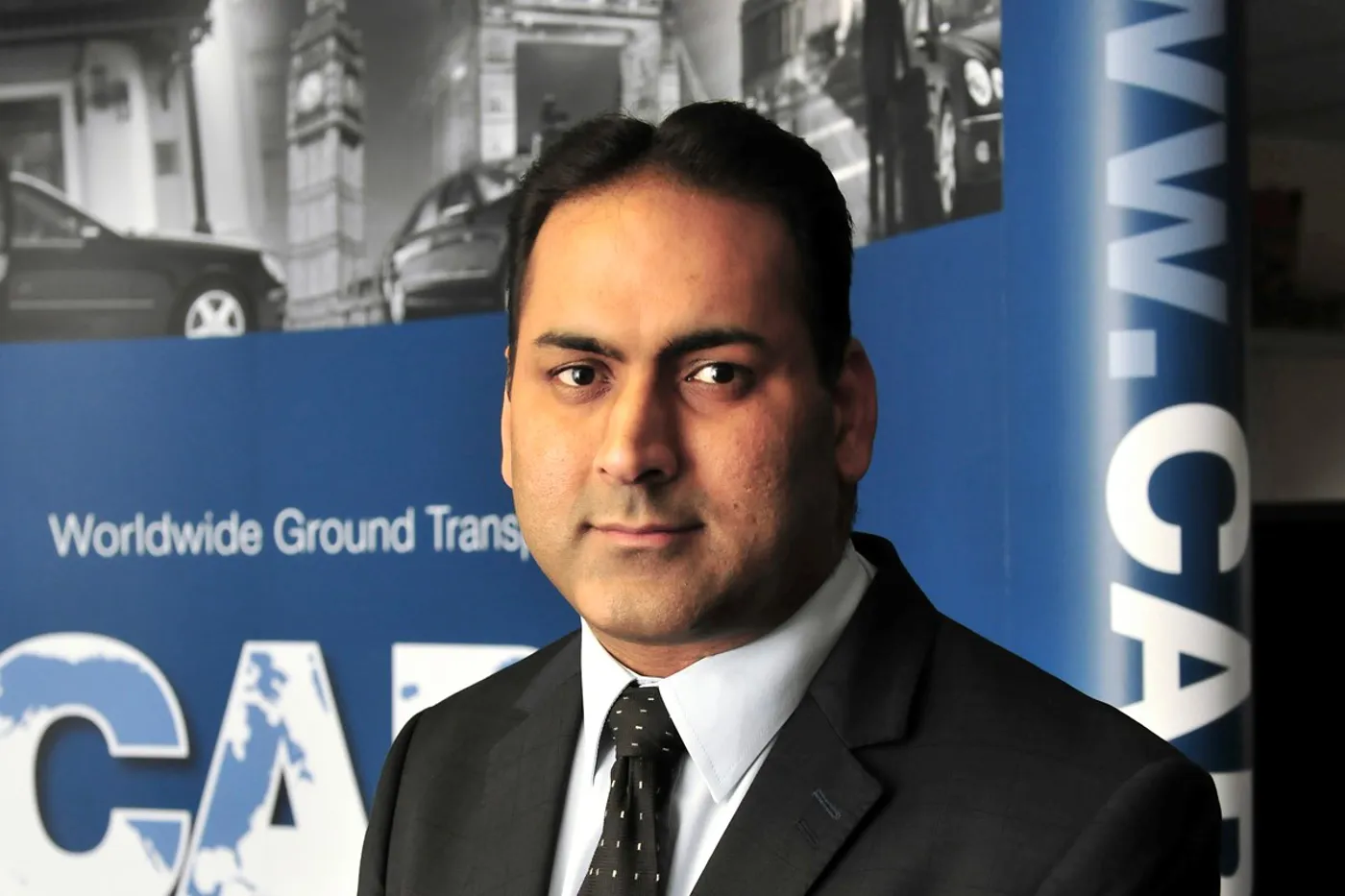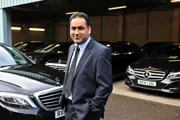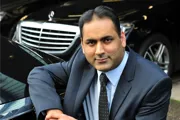Are chauffeurs the safest drivers on the planet?
Nabeel Sheikh, deputy director of operations and fleet manager at Carey Worldwide Chauffeured Services, believes so.
Sheikh, who joined the company almost 11 years ago with responsibility for dispatching cars to customers, inherited the fleet manager role in 2010 and now leads a five-strong team with all aspects of the operation managed internally.
The company operates a fleet of 200 Mercedes-Benz E-Class, S-Class and Viano MPV vehicles fitted with speed limiters, set to 75mph, and telematics, as well as a suite of sophisticated standard safety equipment that includes autonomous emergency braking on the newest vehicles.
A combination of this technology and driver education will help the company achieve its aim of reducing its incident rate by 30% next year, and its long-term target of a zero-accident culture. The company recorded more than 100 accidents last year and “it is important that the company and the drivers learn from them”, according to Sheikh.
Factfile
Company: Carey Worldwide Chauffeured Services
Deputy director of operations and fleet manager: Nabeel Sheikh
Time in role: Five years
Fleet size: 200 cars
Funding method: Contract purchase
Operating cycle: Three years
Vehicle brand operated: Mercedes-Benz
“Technology is never enough. We will reduce our incident rate through educational sessions for drivers, revising them from time-to-time.”
However, equally important is vehicle maintenance. “Vehicles must be in pristine condition, and that includes drivers reporting damage or warning lights,” says Sheikh.
“All are visible to passengers, and it could cost us business.”
The company’s 235 full-time and part-time chauffeurs are all employees, rather than self-employed. “It means that we are able to keep close control over hours worked to ensure maximum attention is paid to health and safety,” explains Sheikh.
“That is how we are able to deliver a consistent level of service with a consistent focus on education, education, education.”
Collectively, chauffeurs make some 700-800 journeys per day, with 75% of trips London-based. Airport transfers account for a large volume of business, with the company having major contracts with Emirates and Qantas as well as smaller airlines.
A wide cross-section of other work includes chauffeur duties for many of the largest companies in London across various markets including financial, event management, travel and hotels.
Carey operates out of a purpose-built chauffeur garage in Brentford, chosen for its proximity to Heathrow, London’s busiest airport, and the City of London.
“London driving is becoming more difficult, particularly with the number of cyclists increasing,” says Sheikh.
“We have always been focused on educating our chauffeurs to drive as safely as possible, but in the past three years our education programme has intensified.”
Central to that has been fitting the speed limiters to all vehicles. They are set at 75mph to enable higher-speed manoeuvres to be made, if required, and this year telematics systems have been installed following an initial six-model, eight-week pilot.
“There is a human element involved in all accidents,” says Sheikh, who emphasises that every incident, however small, is recorded and investigated.
“Fitting the limiters helped re-focus chauffeurs’ minds on ensuring that they, our customers and other road users complete their journeys as safely as we could ensure.”
The roll-out of telematics across the fleet, specifically measuring harsh braking and acceleration, speeding and idling, further underpins the company’s safety focus, while also helping to reduce its carbon footprint.
Thresholds for each are set on according to model type. “We want our chauffeurs to drive smoothly and sympathetically, but also efficiently,” says Sheikh. “We believe our chauffeurs were already good drivers, but the technology is making them better drivers.”
Sheikh admits there was an initial “backlash” from chauffeurs to the technology.
“They are now accepting it,” he says. “They understand that the technology is helping them to drive even better, with a focus on their own safety and that of their passengers and other road users.”
Carey is a corporate partner and supporter of road safety charity Brake, and Sheikh was highly commended in the organisation’s annual Company Driver Safety Award in 2013.
As part of their training, chauffeurs are signatories of Brake’s Pledge 2 Drive Safely Campaign – a personal commitment to stay safe and legal.
It covers key safety-related aspects of driving activities, including: adherence to speed limits and driving at a speed appropriate to the conditions; zero tolerance of alcohol, illegal drugs or medication which may impair driving abilities; ensuring they are alert and ready to drive safely; adherence to the law; Carey’s own internal regulations on the use of mobile phone; use of seat belts for themselves and passengers; and, in con- junction with the company’s own envir-onmental training, avoiding unnecessary driving to reduce pollution.
Mercedes-Benz diesel cars are operated exclusively because, says Sheikh, “people who are chauffeured expect a certain status and Mercedes-Benz delivers what clients demand”. The cars, which are changed on a three-year replacement cycle, clock an average 40,000 miles per year and are funded through contract purchase.
Just as safety is in the company’s DNA, so the business has an environmental focus through a carbon off-setting programme that enables it to reduce its carbon footprint to zero. In partnership with The Carbon Neutral Company, it offsets 100% of its UK vehicle-related carbon emissions by investing in ‘green’ projects in diverse regions around the world (fleetnews.co.uk/carey-environment for the full story).
The company’s fuel bills average £70,000-£80,000 per month. Carey is looking at introducing the new breed of Mercedes-Benz hybrid cars to the fleet to help reduce fuel consumption.
However, it has to-date ruled out the viability of plug-in vehicles for a number of operational reasons, including the potential inability of chauffeurs to charge cars at home.
All the dark coloured chauffeur cars have air conditioning, a financial newspaper and bottled mineral water from One Water, which donates all profits to The One Foundation to fund water projects in African villages which have no easy access to clean drinking water.
At Carey’s Brentford headquarters, vehicles are cleaned and re-stocked with the financial newspapers, bottled water and moisturised tissues between jobs.
All service, maintenance and repair work is handled by the Mercedes-Benz franchised dealer network with Carey having a preference for a ‘while-you-wait’ service to keep vehicle downtime to an absolute minimum.
When cars are defleeted, Carey values vehicles at the Cap ‘clean’ standard and then sells to an established network of dealers or, if necessary, sends models to auction.
Sheikh says driver education remains his single biggest challenge.
“Nothing is possible if you don’t get everyone on your side,” he says.
“That is achieved through education. We explain to chauffeurs the business importance of driving safely and portraying the right image to all of our clients.”
Journey to employment
Chauffeurs are their employer’s ambassadors and their customers are some of the world’s most high-profile firms, with passengers typically industry and commerce professionals.
Not surprisingly, Carey Worldwide Chauffeured Services expects chauffeurs to be immaculately presented in all areas of personal appearance, mannerism and personality, and to demonstrate a customer-focused approach to their role.
All Carey chauffeurs have a full clean driving licence, are fluent English speakers and wear full company uniform at all times: black suit, white shirt, company tie and black leather shoes.
A job application is followed by a ‘knowledge test’, which requires would-be chauffeurs to know direction of travel – north, south, east or west – and major London roads. It is followed by a 30-minute driving assessment around local roads, checking to see if the individual is comfortable with the vehicle and their basic road skills. If successfully completed, they are given an interview.
Successful completion of the three-phase recruitment stage will lead to a full-time job and initially a two-week intensive training programme undertaken by Carey’s own recruitment and training division that aims to ensure the organisation employs the best chauffeurs and trains them to best-in-class standards.
“We go through every aspect of chauffeuring and different eventualities with our employees,” says Nabeel Sheikh. “Most importantly, we focus on speed and driving style because passengers must arrive safely and unflustered and during the journey they may want to work, read papers in readiness for their next meeting or simply relax.”
As part of Carey’s training and certification programme, chauffeurs are instructed on the latest and most efficient driving techniques. Controlled studies conducted by the in-house training team show that fuel and emissions savings of more than 10% are achieved.
Finally, having successfully completed the two-week training programme, chauffeurs will be allocated their car. But even then there is a continual programme of driving assessment involving managers, the control room and management information from telematics systems.
Employees new to the job of chauffeuring will initially focus on ‘easier’ work, such as pre-booked airport transfers, and will be expected to plan their route and complete at least one dummy drive prior to the journey.
So-called ‘harder’ work, which might include an unscheduled pick-up working within a fixed timetable, is given to more experienced chauffeurs.
Clients are greeted in an “appropriate manner” and assistance is offered at all times with any baggage while doors are opened for passengers.
Carey chauffeurs are trained to “call the passenger by their name twice, so the passenger knows that their chauffeur is aware of their name, but then never initiate a conversation”, says Sheikh. They may only respond to the passenger. The chauffeur will inform the passenger of the approximate length of time the journey will take, ask if the temperature in the car is ok and advise of the seatbelt requirements. No radio will be on unless requested.
Carey’s VIP service training is delivered by training manager Eddie Ofstein – who has more than 30 years’ experience. A small group of dedicated chauffeurs are trained to manage security threats.




















Login to comment
Comments
No comments have been made yet.